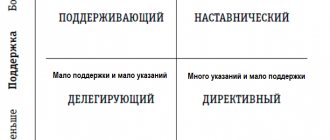Author of the material:
Inna Trofimova
writer, psychologist, gestalt therapist
Rene Descartes said, “Respect for others gives rise to respect for oneself.” And he was right: these two expressions of respect maintain harmony, which protects us from exhausting conflicts and misunderstandings. Who (or what) else demands respect? What to do if you literally feel someone else's disrespect? What actions can you use to emphasize the value of another person? And why can an advance be obtained not only in money? The answers are in the article.
What is respect?
Respect is the ability to take into account the boundaries and interests of other people, to see and recognize their merits, to notice individuality, to observe a socially acceptable format of communication, to interact without causing moral or physical harm. This is the ability to accept without judgment the actions, behavior, and statements of another person, even if we do not share or understand his motives. Respect is a constant in the formula of human relationships and one's own identity.
Why respect is so important:
- Helps you notice and respect another person’s personal boundaries and maintain your own.
- Serves as the basis for high self-esteem, self-esteem, a sense of personal worth, self-efficacy, psychological and mental health.
- Helps to withstand other people's condemnation, criticism, and hostility.
- Gives you the opportunity to show your best qualities: kindness, empathy, care.
What happens if we stop respecting each other? People are not machines; they immediately sense the falseness of ostentatious attention. And playing “respect” doesn’t work for long. It is impossible to force someone to respect you. Respect is not bought, not developed through prohibitions, fear, whips or encouragement. It arises when a person notices in others qualities and virtues that he considers significant and important, which he himself strives for.
The word “respect” is not found in the texts of Antiquity, but discussions about the concept of “respectus” - “attention, reverence” are found in the works of Aristotle, Socrates, and Democritus. The word "respect" is borrowed from several European languages. So, for example, in German there is the word “Wage” - “important”, and in Polish “uwazny” - “to be attentive”, “uwaga” - “attention”. The cognate word “waga” - “weight” further reveals the meaning of the concept. After all, a person who enjoys respect, influence, and has a worthy reputation is said to “have weight in society.”
There is another theory about the origin of the word: respect - from the word “important” . This means learning to do what is important for another person, trying to respect him and his interests. In order to coexist peacefully or get something, you need to take into account the desires of the other, otherwise conflict cannot be avoided.
Take a self-confidence test
Types of respect.
Do you want to make better decisions, find your ideal career, realize your maximum potential and receive instructions for individual development?
?
All this can be done using the Human Design
. Build your map and get basic decryptions for free.
In the works of ancient philosophers, and later in the works of R. Descartes, I. Kant, B. Pascal, it was about respect for the law, human rights, and the institution of citizenship. Respect for human rights was considered the basis of the rule of law, with the “respected individual” at the center. Gradually, the meaning of the concept expanded and spread to other areas of life.
What kind of respect can there be?
- To your “I”. In a world where everyone tries to offend or deceive, it is extremely difficult to strengthen self-esteem. But it is necessary. Self-respect means knowing exactly what you are capable of and what you are not. This is the ability to accept yourself entirely and not depend on the opinions of others. Self-esteem is the internal value and importance of an individual to himself.
- To others. This ability manifests itself at all levels: communication with elders, with equals, with juniors. For example, this is an attentive attitude towards parents, partners, children, employees, acquaintances and strangers, mentally retarded and elderly people. This is a tolerant attitude towards the religious beliefs of others, towards people of a different sexual orientation.
- To nature. The Vedas have a beautiful definition of respect: it is taking into account the interests of other living beings. Modern ecophilosophy adds: respecting nature is much more important than loving it. This means preserving all forms of life, treating natural resources carefully and with care, and understanding our responsibility to future generations.
- Towards social norms. These are politeness, adherence to traditions, adherence to business ethics, corporate norms, rules of good manners and requirements for appearance. This is an internal culture associated with the rules of decency and the ability to maintain a reasonable distance in relation to people.
- Towards patriotic symbols . This is the ability to respect state symbols: coat of arms, flag, anthem. This is a respectful attitude towards public holidays and historical values.
The familiar expression “respect must be earned” is a dead end. Every person receives the right to respectful treatment from birth, simply because he lives in the world. It is given as an advance and the person has to do something “bad” in order to dissuade others of this.
What part of the sentence is this?
Official letters often end with a phrase like this:
I rely on your correct understanding of this situation and await further orders.
With respect and hope for long-term cooperation,
General Director A.E.
The paradox of the tradition of putting a comma after “with respect” in business correspondence lies in the fact that the norms of the Russian language do not cover this issue in any way.
From the point of view of Russian syntax, this phrase is an addition governed by the dative case. It stands alongside other similar add-ons:
- "with dignity",
- "with honor"
- "with love",
- "proudly",
- "with sadness",
- “with devotion” and so on.
Let's look at the rules of punctuation with additions:
1 An addition with no punctuation marks is highlighted regardless of what part of the sentence it is in.
With sadness I looked at my aged friend.
Our soldiers protect the peace and tranquility of the country with dignity and honor.
The chief engineer treated the innovators with respect.
2 In the case of listing homogeneous members of a sentence, which includes the phrase “with respect,” the latter is separated by commas on a general basis.
We treat our first teacher with childish love, respect, and ardent affection.
Or:
We treat our first teacher with respect, with childish love, with ardent affection.
Or:
With childish love, with ardent affection, and with respect, we treat our first teacher.
3 If the phrase “with respect” is complicated by the proximity of an introductory word, participial phrase, subordinate clause, then punctuation is observed according to the rules for writing these syntactic constructions.
Unfortunately, the director, who respected Ivanov, did not remove him from work, which led to the accident.
When starting any task, respect safety precautions.
Leskov treated the opinions of his fellow writers with respect, but always went his own way, often contrary to general opinion.
After the release of the poem “The Song of Hiawatha,” Bunin began to be treated with respect, which later resulted in him being awarded the honorary title of academician.
What to do if they don't respect you?
Disrespect manifests itself in many ways. It can be demonstrative or dangerously quiet. The disrespect may not be too much of a concern at first, but over time it will become a problem. In order not to reach a critical point, you need to learn to recognize signals in time.
You may start to worry if:
- You become a favorite target for offensive jokes, remarks, gossip, and discussion.
- They only remember you when someone needs help.
- They interrupt you, don’t listen to you, and pointedly ignore you.
- Your words, conclusions, comments are called into question.
- Your time is not valued - they are late for meetings, do not call back, do not respond to messages.
- You are “forgotten” when it comes to friendly gatherings.
- Your efforts are not taken into account.
- They don't apologize to you.
- You are being scrutinized.
- During communication, you notice contemptuous grins and disdainful gestures of your interlocutor.
- And the most offensive thing: you have become the person on whom it is customary to “wipe your feet.”
It will take a lot of strength to regain respect. But the result is worth it. Here are some tips to deal with disrespect.
Step 1. Don't try to make excuses.
It doesn’t matter for what reason the disrespect arose, excuses will only take away strength, but will not correct the situation. Moreover, they will constantly remind you of the stupid situation. So the best thing to do is to focus on the next steps.
Step 2. Ask your loved ones.
Talking to those who know you best and are supportive can help you gain new insight into your behavior. You can turn to a close friend, relative, or experienced colleague to get adequate feedback. A heart-to-heart conversation will help to identify flaws in actions, identify problematic aspects in communication, and outline a program of self-re-education.
Step 3. Control yourself.
Those around you are already accustomed to the standard set of your reactions - you need to break this pattern. For example, do not respond to rudeness with rudeness, remain calm in moments of open disdain, and do not cry after hearing a rude joke.
Step 4: Protect yourself.
When self-control reaches a high level, you can begin active defense. For example, learn standard jokes from offenders and come up with cheeky responses to them. Or force the insolent person to apologize. And the rest of the time - work on yourself, work on your self-esteem.
Step 5. Don't take everything to heart.
Sometimes rudeness, neglect, defiant behavior is not a demonstration of disrespect for you personally, but the behavior of your interlocutor. It is worth learning to recognize such people and simply avoid communicating with them. It’s even better to exclude energy vampires, whiners, sycophants, and boors from your life. And direct the energy of communication to adequate, well-mannered interlocutors.
Step 6: Learn to show respect for others.
Sometimes disrespect is shown to those who do not recognize the value of other people. It is worth monitoring yourself and understanding what mistakes are made during communication. For example, these could be ambiguous words or familiar gestures that you are not used to attaching meaning to. But for others they can be offensive.
Take the self-esteem test
Notes
- ↑ 12
Zorin, 2002. - ↑ 123
Kohn, 1981. - Heigl-Evers, Heigl, Ott, Rueger, 2001.
- Gulina, 2008.
- Sukharev, Zorkin, Krutskikh, 1998.
- Vlasova, 2011.
- Kashepov, 1996.
- [vivovoco.astronet.ru/VV/LAW/BRD.HTM Basic Law of the Federal Republic of Germany of May 23, 1949 Part 1 Art. 1]
- [www.norge.ru/constitusia/ Constitution of Norway. Amended July 23, 1995. Article 110-c]
- [chinalawinfo.ru/constitutional_law/constitution_ch2 Constitution of the People's Republic of China of 1982 (as amended in 1988, 1993, 1999, 2004). Art. 33] (unavailable link since 05/26/2013 (3125 days))
- [archive.is/20120719062340/worldconstitutions.ru/archives/78 Constitution of South Africa. Adopted on May 8, 1996, as amended by the Constitutional Assemblies on October 11, 1996. Art. 10]
- [www.zakonrf.info/zakon-o-policii/5/ Federal Law “On the Police”. Part 1 art. 5]
- [www.garant.ru/products/ipo/prime/doc/1257567/ Code of Ethics and Official Conduct of a Federal Civil Servant of the Federal Bailiff Service (approved by order of the Federal Bailiff Service dated April 12, 2011 No. 124). Clause 4.2]
Examples of treating others with respect.
The word “respect” is not often used by Christians. But reflections on respect, acceptance, hospitality, rules of decency, and the ability to take into account the interests of a husband/wife are much more common in Christian texts. The most peaceful religion, Buddhism, says something like this: “A society without respect for elders, without caring for women, children, and spiritual people, is doomed to suffering.”
Respect for everything is brought up from childhood by the personal example of parents. A child will learn to care about the interests of others if parents:
- They politely greet, say goodbye, and thank anyone who provided a service or helped.
- They apologize for the mistakes they have made.
- Remain calm in an argument.
- They hold the door behind them.
- They keep other people's secrets.
- They ask permission to take other people's things.
- They knock before children and parents enter the room.
- Maintain cleanliness in nature and public places.
- Respect the personal space and boundaries of another person, regardless of age.
- They help others if they really can help.
- They respectfully speak about other people's opinions, views, and preferences.
- They defend their rights in a mannered manner, without aggression.
- Do not interrupt to express your point of view.
- By actions and words they show respect for parents, friends, colleagues, acquaintances and strangers.
Literature
- Large legal dictionary / Ed. A. Ya. Sukhareva, V. D. Zorkina, V. E. Krutskikh. - M.: INFRA-M, 1998. - P. 712-713. — (Library of dictionaries “INFRA-M”). — 60,000 copies. — ISBN 5-86225-578-8.
- Vlasova O. V.
[law.edu.ru/book/book.asp?bookID=1442225 Human dignity as a moral and legal value: a general theoretical study] / abstract of the dissertation for the degree of Doctor of Law. Specialty 12.00.01 - theory and history of law and state; history of doctrines about law and state; Scientific cons. O. I. Tsybulevskaya. — Saratov: Sarat. state acad. Law, 2011. - 54 p. - Gulina M. A.
[www.voluntary.ru/dictionary/903/word/%D3%E2%E0%E6%E5%ED%E8%E5+%EA+%EB%FE%E4%FF%EC Respect for people] // Dictionary reference book for social work. - St. Petersburg: Peter, 2008. - 400 p. — ISBN 978-5-469-00450-9. - Julia D.
[terme.ru/dictionary/878/word/uvazhenie Respect] // Philosophical Dictionary = Dider Julia Dictionnaire de la philosophie / Transl. from French N.V. Andreeva. - M.: International Relations, 2000. - 544 p. — ISBN 5-7133-1033-7. - Zorin V.I.
[www.terme.ru/dictionary/470/word/%D3%C2%C0%C6%C5%CD%C8%C5 Respect] // Eurasian wisdom from A to Z: philosophical explanatory dictionary. - Almaty: Sozdik-Dictionary, 2002. - 408 p. - Kashepov V.P.
[www.az-design.ru/index.shtml?Projects&AZLibrCD&Law/Constn/KRF93/krf021 Commentary on Art. 21 of the Constitution of Russia] // Commentary on the Constitution of the Russian Federation / ed. L. A. Okunkova. — 2nd, extra. and processed - M.: BEK Publishing House, 1996. - ISBN 5-85639-159-4. - [www.terme.ru/dictionary/522/word/%D3%C2%C0%C6%C5%CD%C8%C5 Respect] // Dictionary of Ethics / Ed. I. S. Kona. - M.: Politizdat, 1981. - 430 p.
- Heigl-Ewers A., Heigl F., Ott U., Rüger U.
[vocabulary.ru/dictionary/800/word/%D3%E2%E0%E6%E5%ED%E8%E5 Respect] // Basic Guide in psychotherapy. - St. Petersburg: Speech, East European Institute of Psychoanalysis, 2001. - 784 p. — ISBN 5-88787-018-4. - Dillon, Robin S.
[plato.stanford.edu/entries/respect/ Respect] // Stanford encyclopedia of philosophy / Edward N. Zalta (ed.). — 2003.
Passion and butterflies in the stomach
At the very beginning of a relationship, we are guided mainly by feelings and emotions. Especially when this love is the first and there is no need to think about the future at all. We are overwhelmed with emotions, life is in full swing. Our feelings are light and without pressure.
Tweed shirt and other fashion trends among outerwear for spring 2021
A local woman climbed into an ice cave under a glacier in Alaska: video
Astronomers have discovered a supermassive black hole in the early Universe
For us, our beloved is the center of the Universe; everything revolves around him. Perhaps it is precisely at this moment, when we put ourselves in second place, that true altruism and the purest love live in us.











